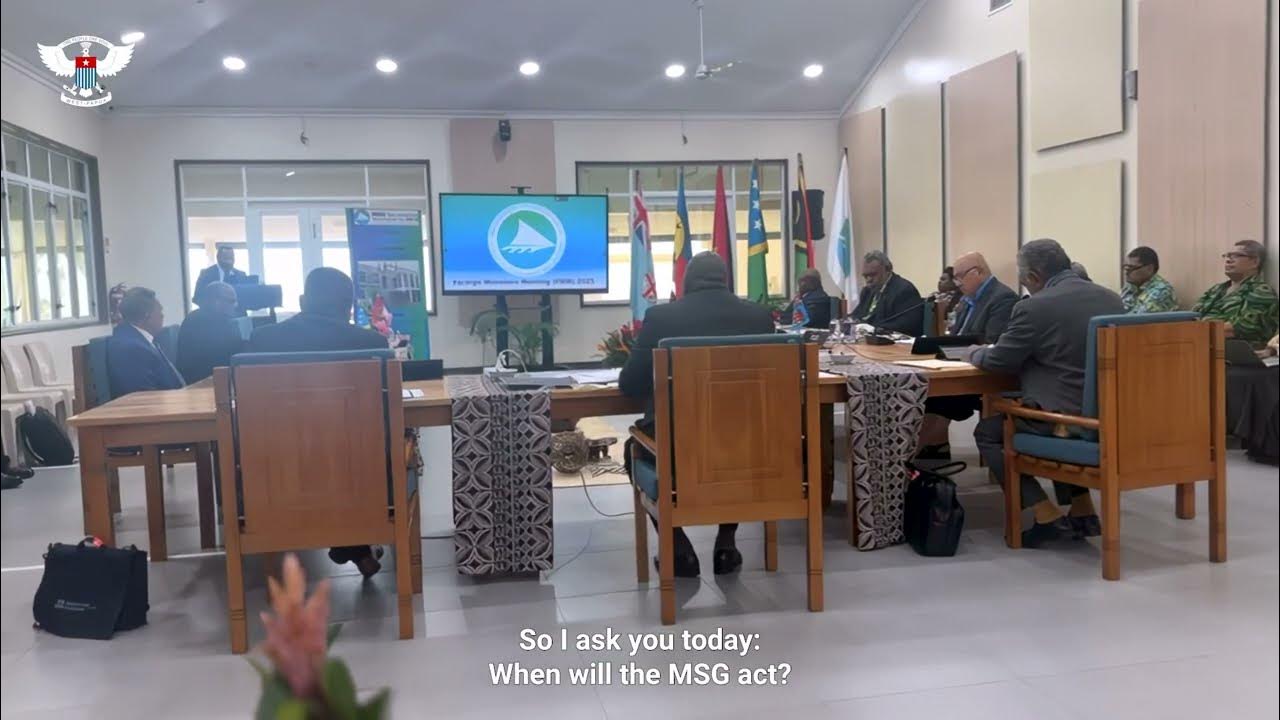Memaknai Kebijakan PBB dalam Hubungan Antar Negara, Studi Kasus Papua Barat dengan Vanuatu
Summary
TLDRThis presentation discusses the United Nations' role in addressing human rights violations and the ongoing conflict between West Papua and Indonesia, with a particular focus on Vanuatu's support for West Papua's independence. Vanuatu has consistently criticized Indonesia for its treatment of West Papua, citing human rights abuses and shared ethnic ties. The presentation traces the history of this issue from 1969, detailing Vanuatu's advocacy at the UN and its stance on the self-determination of West Papua. The United Nations' policy on sovereignty and non-interference in internal matters is also highlighted.
Takeaways
- 😀 The United Nations (UN) was established on October 24, 1945, to promote international cooperation and prevent conflicts like World War II, initially replacing the League of Nations.
- 😀 The UN's main goals include maintaining world peace, promoting human rights, fostering international cooperation, addressing global issues, and providing humanitarian aid during crises.
- 😀 Vanuatu has been an active advocate for Papua's independence from Indonesia, emphasizing the human rights violations that they believe have occurred in the region.
- 😀 Vanuatu's criticism of Indonesia's treatment of Papua dates back to the 1969 Act of Free Choice (Pepera), which Vanuatu claims was unfair and manipulated by Indonesia.
- 😀 The relationship between Vanuatu and Papua is rooted in shared Melanesian ethnicity and cultural connections, fueling Vanuatu's continued support for Papua's independence.
- 😀 In the 2010s, Vanuatu repeatedly raised the issue of human rights violations in Papua at UN General Assembly sessions, urging the international community to take action.
- 😀 Vanuatu's efforts to support Papua's independence are seen as an extension of domestic political pressure, influenced by the local political climate in Vanuatu.
- 😀 Vanuatu's support for Papua's independence led to the country joining the Melanesian Spearhead Group (MSG) in 2015, further solidifying its stance on the issue.
- 😀 The UN, under its Charter (Article 2, Sections 1 and 4), emphasizes the sovereignty of nations and prohibits interference in another nation's internal affairs, which has impacted the Papua-Vanuatu situation.
- 😀 Despite Vanuatu's persistent advocacy, including requests for UN visits to assess human rights conditions in Papua, Indonesia's sovereignty remains a key factor in the UN's approach to the issue.
Q & A
What is the main purpose of the United Nations (UN) as described in the script?
-The United Nations (UN) was established on October 24, 1945, to promote international cooperation, maintain peace and security, encourage friendly relations among nations, and foster respect for human rights.
What role does Vanuatu play in the issue of Papua Barat's independence?
-Vanuatu has been a consistent advocate for the independence of Papua Barat, supporting the region's self-determination and human rights concerns. It has criticized Indonesia's actions in Papua and pushed for international intervention through the UN.
Why did Vanuatu support Papua Barat’s independence after the 1969 referendum?
-Vanuatu believed the 1969 referendum, known as 'Pepera' or the 'Act of Free Choice', was unfair and manipulated by Indonesia. Vanuatu viewed the vote as lacking proper oversight, and they called for it to be repeated with international supervision.
How did Vanuatu's domestic politics influence its foreign policy regarding Papua Barat?
-Vanuatu's domestic politics, particularly its solidarity with Melanesian nations, influenced its foreign policy to support the independence of Papua Barat. The nation's leaders used their domestic political stance to push for international actions against Indonesia's treatment of Papua.
What actions did Vanuatu take at the United Nations regarding Papua Barat?
-Vanuatu raised the issue of human rights violations in Papua Barat at the UN General Assembly, starting in 2016. The country consistently pushed for international recognition of Papua's plight, calling for UN human rights commissions to investigate the situation.
How does the UN’s stance on sovereignty relate to the Papua Barat issue?
-The UN upholds the principle of non-intervention in the domestic affairs of sovereign nations. According to the UN Charter (Article 2, Section 1 and 4), no country is allowed to interfere in another country's internal matters, which includes the situation in Papua Barat.
What is the significance of Vanuatu’s Melanesian identity in its support for Papua Barat?
-Vanuatu shares a cultural and ethnic connection with the people of Papua Barat through their Melanesian heritage. This shared identity fosters a sense of solidarity and fuels Vanuatu's ongoing support for Papua Barat's independence.
What historical events led to the ongoing conflict between Vanuatu and Indonesia over Papua Barat?
-The conflict began with the 1969 'Pepera' referendum, where Vanuatu believed the vote to remain with Indonesia was coerced. Over the years, Vanuatu has continued to advocate for Papua Barat's independence, citing human rights violations and cultural ties between the two regions.
How did Vanuatu's diplomatic actions evolve over time concerning Papua Barat?
-Vanuatu’s actions became more formal and consistent over time. After initially raising concerns in 1969, it began making official requests at the UN, particularly during the 2016-2020 UN General Assembly sessions, seeking international recognition of the human rights issues in Papua Barat.
What was the United Nations' position on the Papua Barat issue in terms of international intervention?
-The UN’s position, as stated in its Charter, is that intervention in a country's internal affairs is prohibited, upholding the sovereignty of nations. This principle has been a challenge for Vanuatu’s efforts to gain international intervention in the Papua Barat issue.
Outlines

此内容仅限付费用户访问。 请升级后访问。
立即升级Mindmap

此内容仅限付费用户访问。 请升级后访问。
立即升级Keywords

此内容仅限付费用户访问。 请升级后访问。
立即升级Highlights

此内容仅限付费用户访问。 请升级后访问。
立即升级Transcripts

此内容仅限付费用户访问。 请升级后访问。
立即升级浏览更多相关视频

148 ANGGOTA ILWP & ILWP DESAK MSG TINGKATKAN STATUS ULMWP

[FULL] Diplomat Muda RI Silvany Pasaribu Serang Balik PM Vanuatu Soal Isu Papua

Inside Indonesia's Secret War for West Papua | Foreign Correspondent

Lengkap! Kalimat Menohok Diplomat RI Silvany Pasaribu pada Vanuatu

MSG Foreign Minister Meeting | 20 June 2025 | Fiji, Suva | ULMWP Spokesperson Raki Ap | West Papua

Papua Blood: Buku yang Membawa Suara Kemanusiaan dari Papua ke Dunia | Refleksi Sebby Sambom
5.0 / 5 (0 votes)
